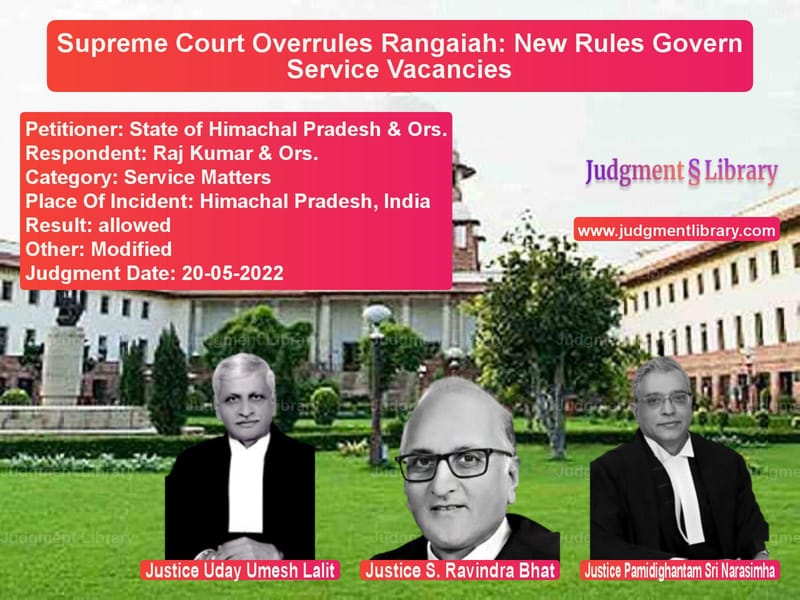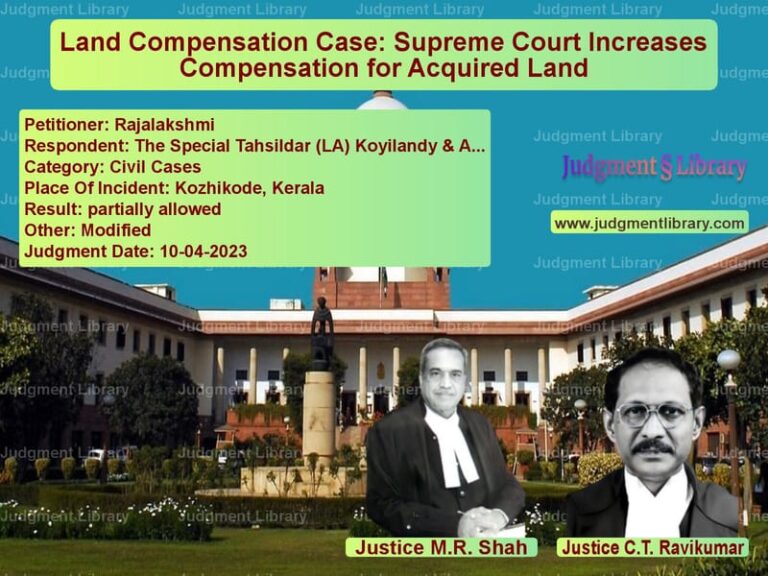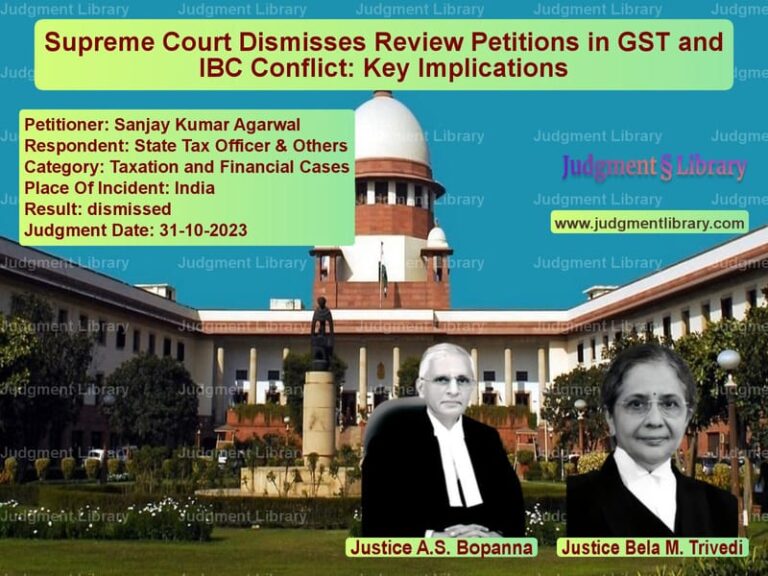Supreme Court Overrules Rangaiah: New Rules Govern Service Vacancies
The Supreme Court in the case of State of Himachal Pradesh & Ors. vs. Raj Kumar & Ors. and Anurag Sharma & Ors. vs. State of Himachal Pradesh & Ors. has decisively ruled on a longstanding issue concerning appointments in public services. The core issue before the Court was whether vacancies arising before the amendment of service rules should be governed by the old rules or the new rules.
Background of the Case
The dispute arose when the State of Himachal Pradesh amended its Labour and Employment Department Recruitment and Promotion Rules in 2006. The amendment introduced changes in the promotion and recruitment process for the post of Labour Officer. Before the amendment, all posts were filled through promotions. The new rules introduced a quota system, allowing 25% of posts to be filled through direct recruitment.
Respondents No. 1 to 3, who were working as Labour Inspectors, challenged the government’s decision to fill vacancies under the new rules. They argued that the vacancies arose before the amendment and should be governed by the old rules, which did not permit direct recruitment. They relied on the Supreme Court’s ruling in Y.V. Rangaiah vs. J. Sreenivasa Rao (1983) 3 SCC 284, which held that vacancies occurring before the amendment of rules should be filled under the old rules.
Key Legal Issues
- Does a government employee have a vested right to be considered for promotion under old rules?
- Can the government take a policy decision to amend recruitment rules and apply them to pending vacancies?
- Was the precedent in Rangaiah still valid law?
Arguments Presented
Petitioners’ Arguments (State of Himachal Pradesh)
- There was no vested right to promotion; employees only had a right to be considered under the rules prevailing at the time of selection.
- The government had taken a conscious policy decision to amend the recruitment rules.
- The High Court erred in blindly applying the Rangaiah ruling.
- Numerous Supreme Court judgments had already distinguished Rangaiah and held that new rules apply unless there is a statutory mandate to apply old rules.
Respondents’ Arguments (Raj Kumar & Ors.)
- The vacancies arose before the 2006 amendment, so they should be filled under the old rules.
- The amendment unfairly denied them promotional opportunities and benefited candidates from outside the department.
- There was no explicit decision by the government to keep vacancies unfilled pending the amendment.
- Rangaiah was binding precedent and should be followed.
Supreme Court’s Observations
The Supreme Court conducted a detailed analysis of case law and found that Rangaiah’s broad proposition had been substantially watered down by later judgments. The Court ruled:
- The government has the right to amend recruitment rules and apply them to pending vacancies unless there is a specific statutory provision stating otherwise.
- Public service is a matter of status, not contract, meaning that an employee’s rights are subject to the rules governing their service.
- Rangaiah was incorrectly understood as establishing an absolute rule that old rules govern old vacancies.
- Several cases had already limited or distinguished Rangaiah, including Deepak Agarwal vs. State of UP (2011) 6 SCC 725 and Union of India vs. Krishna Kumar (2019) 4 SCC 319.
- There is no vested right to promotion; only a right to be considered under the rules prevailing at the time of consideration.
Key Excerpts from the Judgment
“The broad proposition formulated in Rangaiah does not reflect the correct constitutional position. The rights and obligations of persons serving the State are sourced from the rules governing their service.”
“A government employee has no right outside of service rules. The service rules can be amended unilaterally by the State to reflect policy changes.”
Final Verdict
- The Supreme Court overruled Rangaiah, holding that new rules would govern vacancies unless there is a statutory provision stating otherwise.
- The government was allowed to fill vacancies as per the 2006 amended rules.
- Appointments already made under the new rules were upheld.
Outcome: The Supreme Court ruling established that new service rules will govern all future selections, even for vacancies that arose before the amendments, unless a statute explicitly mandates otherwise.
Petitioner Name: State of Himachal Pradesh & Ors..Respondent Name: Raj Kumar & Ors..Judgment By: Justice Uday Umesh Lalit, Justice S. Ravindra Bhat, Justice Pamidighantam Sri Narasimha.Place Of Incident: Himachal Pradesh, India.Judgment Date: 20-05-2022.
Don’t miss out on the full details! Download the complete judgment in PDF format below and gain valuable insights instantly!
Download Judgment: state-of-himachal-pr-vs-raj-kumar-&-ors.-supreme-court-of-india-judgment-dated-20-05-2022.pdf
Directly Download Judgment: Directly download this Judgment
See all petitions in Recruitment Policies
See all petitions in Public Sector Employees
See all petitions in Promotion Cases
See all petitions in Judgment by Uday Umesh Lalit
See all petitions in Judgment by S Ravindra Bhat
See all petitions in Judgment by P.S. Narasimha
See all petitions in allowed
See all petitions in Modified
See all petitions in supreme court of India judgments May 2022
See all petitions in 2022 judgments
See all posts in Service Matters Category
See all allowed petitions in Service Matters Category
See all Dismissed petitions in Service Matters Category
See all partially allowed petitions in Service Matters Category







